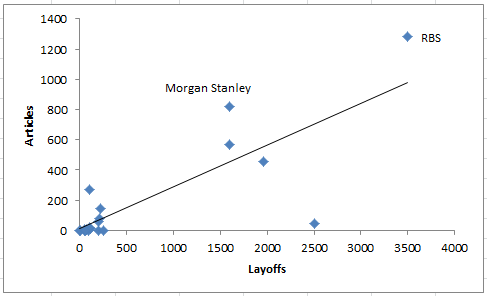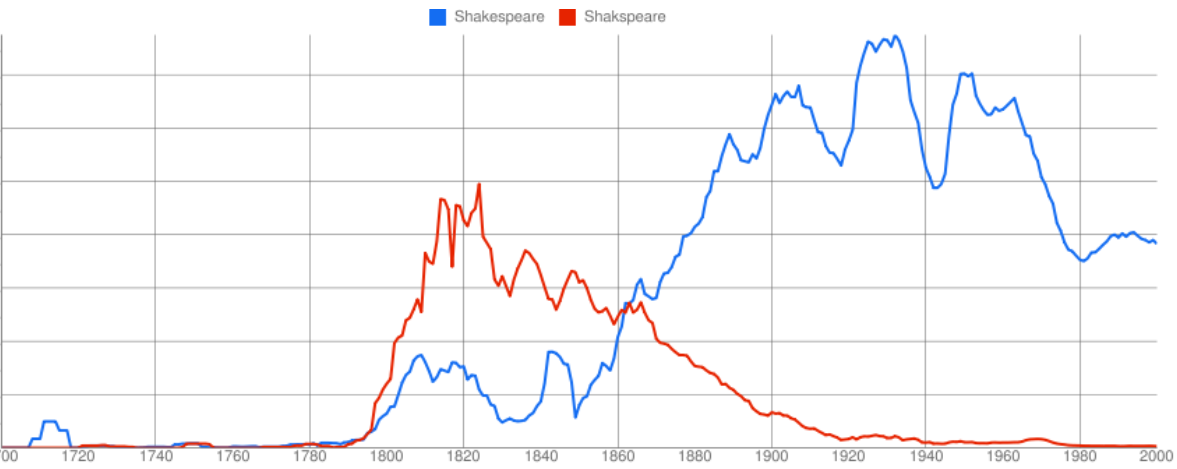Real Life Atlantis
Atlantis was a legendary island that sank beneath the waves, according to Plato.
While many have searched for it, the story of the island is generally believed to be fiction.
However, I learned today that in the modern era, there was an island instantaneously lost. Or, more accurately, blown up.
In 1952 the US government tested the first nuclear fusion bomb, ‘Ivy Mike’ on the island of Elugelab in the Enewetak Atoll. The bomb was so powerful it reduced the island to an underwater crater that was visible from space.
This is what the atoll looked like before;

and this is what it looked like after

as Wikipedia (source for these photos) puts it ‘note crater on left’.
People Don't Fart Like They Used To: More Fun with N-Grams
In playing around with N-Grams on Monday, I noticed that the use of the word ‘fart’ has declined precipitously over the last three centuries.

I was very excited about this, thinking I has just made a major discovery about the history of indigestion.
Unfortunately, digging into the data shows that this is due errors in Google’s OCR.

Clearly these are mis-readings of the word ‘part’. Though the biblical passage is arguably improved by the replacement.
Dying Words: More Fun with N-grams

One of the great things about being in the start-up world now is the excitement around creating something new. All around me people are excited about what they are doing in a way that I haven’t seen since I was in finance at the height of the bubble. And though I’m wary since I’ve lived through a bubble burst, I share the optimism.
But I miss the things that are going out of style. Not in an ironic way, like some people cherish mustaches moustaches, but because I’m sad that some people won’t know the world the way I know it. It is possible to lose technology or language completely. No one knows how to make Damascus steel or speak Linear A anymore.
So this is a tribute to some of the words or concepts that are leaving the English language. All of these words have seen their usage reduced by more than half since their peak, as measured by the always entertaining Google N-Gram Viewer.
Old Technology
As computer word processors continue to kill off the typewriter, it’s no surprise that the word is used less and less.

But changes in physical technology aren’t the only thing that can become obsolete. There are less than 20 ‘true’ monarchies left in the world

Changing Tastes
Sometimes objects just gain negative connotations and fall out of style. Even if you still need them to make a good pie crust.

And Other Reasons
Sometimes it isn’t totally clear why words fall out of favor. I think of the words ‘peculiar’ and ‘remarkable’ as words from the 19th century. And they are. But I can’t think of why. Fortunately, both words seem to be making a comeback (thanks, Brooklyn!).

If you have any ideas that explain the peculiar paucity of the word peculiar, or the remarkable decline in the word remarkable, let me know.
I Heart Chaos: Fun with math: Dividing one by 998001 yields a surprising result
I Heart Chaos: Fun with math: Dividing one by 998001 yields a surprising result
There’s all sorts of magic to be had with numbers, and many mathematicians have made entire careers in finding these little tricks that are mostly useless, but fun anyway. Unfortunately, a lot of calculators are going to truncate the results of this trick, but if you manage to get a hold of one that doesn’t, solving 1/998001 will generate all the three digit numbers from 000 to 999. And in order, no less. If you’re a fan of this kind of math fun, solving 1/9801 will generate all the consecutive two digit numbers.
Noise Machine
I no longer work in finance, but I have a lot of friends who still do. Most of them aren’t that happy right now- they don’t feel very secure in their jobs. And I don’t blame them. But I don’t see a ton of them getting let go. The axe is perpetually hanging over their heads, but never drops.
I think a lot of the reason for insecurity is the obsession with labor issues in the financial press. Bonus season coverage is only fractionally less intense than coverage of the Oscars, as far as I can tell. Relatively minor layoffs end up getting amplified to an extent that I think is utterly ridiculous.
Last week RBS announced layoffs of 3,500 workers (out of about 19,000). That’s fine- everyone has known that RBS is in bad shape. I wanted to read about it (I have friends there) so I checked it on Google News.

To my shock, there were over 1,200 articles about it last week! that’s an article for every three people cut!
I guess that the papers have to work with whatever is in the news, but I still thought that was high. So I did a Google News search for layoffs over the past month to see how much coverage each set of layoffs got. The X axis is the number of layoffs, the Y is the number of articles

I labeled Morgan Stanley & RBS. Not only are they the most covered on a per-layoff basis, but they’re the most covered absolutely as well.
So cheer up, finance people. It’s (probably) not that you’re more likely to get fired: it’s that you’re more likely to hear about it. Many, many times.
[gallery]
Many of you have asked, so here’s what’s going on with me.
WHAT HAPPENED BEFORE
- 8/1979: Born. Grew up in CT, built a killer eraser collection, fell in love with computers.
- Left college to start a company. Fell hard. Fled to India for 3 months.
- Started 2nd company. Learned to be an adult. Fell in love with NYC.
- Moved to SF, discovered burritos & some of my fave people on Earth.
- 9/2011: Got diagnosed with Leukemia!
- Cried. Went through 3 cycles of chemo. Hurt. Thought hard about what I want out of life. Grew up a second time.
TODAY
… After over 100 drives organized by friends, family, and strangers, celebrity call-outs, a bazillion reblogs (7000+!), tweets, and Facebook posts, press, fundraising and international drives organized by tireless friends, and a couple painful false starts, I’ve got a 10/10 matched donor!
You all literally helped save my life. (And the lives of many others.)
WHAT HAPPENS NEXT
Tomorrow, I’ll be admitted to Dana Farber in Boston for 4-5 weeks.
First I’ll get a second Hickman line to allow direct access to my heart (for meds and for nutrients if I’m not able to eat). Over the next week, the docs blast my body with a stiff chemo cocktail to try and eradicate all traces of cancer cells. In the process, the immune system I was born with, and my body’s ability to make blood, are destroyed.
Next Friday, I get my donor’s stem cells by IV. I start on immunosuppressants to prevent my body from rejecting them (I’ll be on them for 12-18 months). For these weeks I’ve no immune system, so I’m severely vulnerable to viruses and bacteria. My hospital room and hallway become my world.
Meanwhile, the stem cells make their way to my bone marrow and, with some luck, start producing platelets, red blood cells, and white blood cells. At this point, my blood type changes to the blood type of my donor. And my blood will now have my donor’s DNA, not my own.
This is science fiction stuff. I can hardly believe it’s even possible, and there’s lots of chances for things to go wrong. It’s frightening.
AFTER THE TRANSPLANT
Recovery to a new state of “normal” takes about a year, but there’s a few storm clouds hovering:
- My immune system is new, like a baby’s. I’m prone to getting sick.
- Just as with any organ transplant, there’s a chance of rejection. Except in this case, it’s my blood that’s the foreign body, and it touches every organ. They call it graft-vs-host-disease and it can cause health issues and organ complications for the rest of my life.
- Successful transplant or not, Leukemia can relapse. Stubborn mofo.
Overall, 75% of AML transplant patients survive year one, 50% make it through year five. My odds are a little better since I’m young.
THE GREAT NEWS
I’ve got a long road ahead. But I’ve got a donor & amazing family & friends. A few months ago I didn’t have many options. Today I have a plan.
I am alive. I start tomorrow. Wish me luck!
Thank you.
Awesome news. Really, really excited to see. Congrats to Amit and his family, and everyone at SAMAR and everywhere else who made this a possibility.
More Fun with N-grams: Shak(e)speare
I saw Richard III at BAM on Friday, which was outstanding. While I was playing around with the N-gram viewer yesterday, I tested some of the spellings of his name and discovered that the spelling we use today only became the popular spelling during the civil war:

I looked into it before Wikipedia went dark, and apparently there is no record of the man ever spelling his name with the first ‘e’. The six signatures appear as follows:
- Willm Shakp
- William Shaksper
- Wm Shakspe
- William Shakspere
- Willm Shakspere
- By me William Shakspeare
Notice the conspicuous absence of the first ‘e’.
I was trying to figure out why the shift to ‘Shakespeare’ happened. Strangely, it seems that British Prime Minister Benjamin D’Israeli might have been the catalyst for the change- he is the only influential person mentioned around that time having strong opinions. By the time of his death in 1881, the spelling ‘Shakespeare’ was preferred 3:1.
Does anyone have any other ideas on why this change happened?
Fun with Google N-gram Viewer: Daddy Issues
I know- it’s not 2004. But Wikipedia is blacked out today so I need some way to amuse myself.

Why NYC Restaurant Grades are Useless (but the inspection scores aren't)
I consider myself fortunate that I have only suffered from food poisoning twice in the portion of my life that I remember. It’s really amazing: figure I’ve eaten an average of 4 times per day since I 8, which is about as far back as I have memories of being sick- that’s well over 30,000 meals & snacks. Given the huge variety (and quantity) of food I eat, and the places it comes from, I’m actually astounded at how well I’ve fared.
Both times that I’ve gotten sick it has been after eating at NYC restaurants. Out of the many hundreds of meals that have been prepared in commercial kitchens in the city, I’m not complaining. But you don’t forget something like that.
When NYC started assigning public grades to restaurants 18 months ago, I thought that it would ensure that these things would happen less and less frequently. But both of the places I got sick at ended up getting the highest grades. And I thought, how could this be? Small sample side notwithstanding, it seemed like something was amiss.
So last month I finally started to look at how the restaurant scores are calculated. Using Tableau Public, I put together a little resource for people to see how restaurant inspection scores have changed over time. You can see it here.
